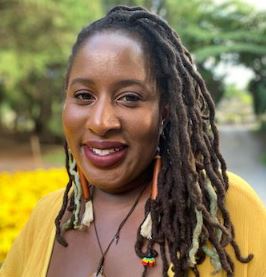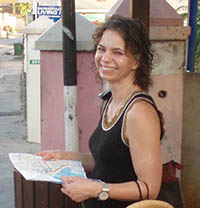
Sean Bellaviti
Sessional Instructor, Department of Philosophy - Music, Ryerson University
Associate Fellow
About Sean Bellaviti
Bellaviti is an Instructor at Ryerson University. His research interests include the development of musical nationalism in Panama, genre studies, the political economy of Latin America and Caribbean popular music and dance, and folk music collections in the Americas. More recently, he has undertaken a new area of study best described as a social history of Toronto's salsa scene.
Country(ies) or Region(s) of Specialization: Panama, Cuba, Venezuela, Puerto Rico, Dominican Republic, Canada and US
Keywords: ethnomusicology of Panama, nationalism, Canada and US Latin@ diaspora, political economy of musical performances, arts and media, cultural studies, genre studies, salsa

Shaunasea Brown
Assistant Professor, Communication Studies, Wilfrid Laurier University
Associate Fellow
About Shaunasea Brown
Shaunasea’s research collaborates with artists in Toronto to delineate a specifically second-generation understanding of Black women’s arts practices. She is interested in how Black Canadian women artists of Caribbean descent offer blueprints for living relationally and suggest methods for radical community care. She also sings and plays piano and guitar. Her current playlist includes Chronixx, Bob Marley, Koffee, Shenseea, Adria Kain and Mustafa the Poet.
Future research will explore how sound can be used to rearticulate Black life in ways that refuse anti-black logics perpetuating Black death worldwide.
Country(ies) or Region(s) of Specialization: Canada, Caribbean Region
Keywords: black canadian women's art, music,

Ricia A. Chansky Sancinito
Associate Professor, Department of English, University of Puerto Rico at Mayaguez
Associate Fellow
About Ricia A. Chansky Sancinito
Ricia Anne Chansky is Associate Professor of literature at the University of Puerto Rico at Mayagüez. She is editor of the new book series, Routledge Auto/Biography Studies; coeditor of the journal, a/b: Auto/Biography Studies, and of The Routledge Auto/Biography Studies Reader; and, editor of Auto/Biography Across the Americas: Transnational Themes in Life Writing and Auto/Biography in the Americas: Relational Lives. She is a Fulbright Specialist in US Studies with a focus on literature, a member of both the Executive Board of the Modern Language Association Genre Studies Forum in Life Writing and the Executive Board of the International Auto/Biography Association as well as the Chair of the Steering Committee of the International Auto/Biography Association Americas Chapter. She has ongoing projects on diasporic Caribbean literatures, transnational narratives, pedagogical autoethnography, feminist visual rhetorics, and gender and identity.
Country(ies) or Region(s) of Specialization: Puerto Rico, US
Keywords: diasporic Caribbean literatures, transnational narratives, pedagogical autoethnography, feminist visual rhetorics, and gender and identity.

Juanita de Barros
Professor, Department of History, McMaster University
Associate Fellow
About Juanita de Barros
My research concentrates on the 19th and 20th century Caribbean in the context of the African diaspora and the British empire. I address such topics as urban history, gender, the history of childhood, and the social history of health and medicine.
My most recent book is Reproducing the British Caribbean: Sex, Gender, and Population Politics after Slavery (http://uncpress.unc.edu/books/12613.html University of North Carolina Press, 2014). It explores ideas and policies about population growth and infant and maternal welfare in British Caribbean colonies from the nineteenth century to the 1930s.
Country(ies) or Region(s) of Specialization: the Caribbean
Keywords: gender, history of health, urban history

Kalowatie Deonandan
Professor, Political Studies, University of Saskatchewan
Associate Fellow
About Kalowatie Deonandan
Her research concentrates on:
- Democracy, Mining and Development in Latin America
- Women and Mining Development
- Women and Nuclear Development
- Indigenous Women and the Mining Industry in Canada and Latin America
- Canadian foreign policy
Country(ies) or Region(s) of Specialization: Latin America
Keywords: Development, Foreign Policy, Human Rights, Indigenous, Mining, Nuclear, Politics, Resource Development, Women

Audra Diptee
Associate Professor, Department of History, Carleton University
Associate Fellow
About Audra Diptee
Her research concentrates on issues related to:
- The Caribbean & Africa
- Humanitarianism & Human Rights Discourse (Caribbean)
- Childhood & Children
- Slavery & Human Trafficking
- Critical Applied History, Memory, Historical Consciousness
- Race & Racism
Country(ies) or Region(s) of Specialization: The Caribbean and Africa
Keywords: Caribbean, Africa, History of Childhood & Children, Slavery, Race Relations

Ramabai Espinet
Lecturer II, Caribbean Studies, New College, University of Toronto
Associate Fellow
About Ramabai Espinet
Dr. Ramabai Espinet is an academic, a writer, and a critic. A graduate of York University, (B.A. Hons. English, M.A. English), she completed her PH.D (1993) at the University of the West Indies, Trinidad. Her thesis examined the place of Euro-Creole women writers, with particular reference to the work of Jean Rhys and Phyllis Shand Allfrey. She teaches in the Caribbean Studies Program (Post-Colonial Literature and Women’s Studies) at New College, University of Toronto. Dr. Espinet retired recently from her post as Professor of English, Seneca College, Toronto.
Her published creative works include the novel, The Swinging Bridge (2003), a finalist for the Commonwealth Writers’ Prize in 2003, a text of the Robert Adams lecture series (Canada), long listed for the IMPAC literary prize in 2005 and published in Paris by Editions du Rocher (Le Pont Suspendu) in 2007. In 2008, Ramabai Espinet received the inaugural Nicolas Guillen Prize for Philosophical Literature from the Caribbean Philosophical Association. Her publications include the collection of poetry Nuclear Seasons (1991), the performance piece Indian Robber -Talk, and the children's books The Princess of Spadina (1992) and Ninja's Carnival (1993). Espinet’s short fiction and poetry are published in anthologies such as Trinidad Noir, Blue Latitudes, Green Cane and Juicy Flotsam, Beyond Sangre Grande, Another Way to Dance and Wheel and Come Again, and also in journals such as Small Axe and the Massachusetts Review. She edited Creation Fire (1990), an anthology of 121 Caribbean women poets in several languages. Her scholarly essays are published widely; she also writes in a popular medium on subjects of current interest. Her field of academic research and writing is Post-Colonial Literature. A documentary on Ramabai Espinet’s work, Coming Home (2005) has been made by Leda Serene Productions in Toronto.
Country(ies) or Region(s) of Specialization: West Indies, Trinidad, Caribbean
Keywords: Euro-creole women writers

Dolores Figueroa
Post-Doctoral Fellow, CIESAS, Mexico
Associate Fellow, Visiting Researcher
About Dolores Figueroa
Generally speaking my academic interests are focused on the gender politics of indigenous movements, the political participation of indigenous women in the public realms and the subjective construction of indigenous leaders as mediators of their communities in different levels of governance.
My analytical work is located at the intersection of debates on indigenous women’s identity politics in Latin America, transnational feminism, and the politics of the adoption of human rights discourse at global and local levels. I have been interested during the last years on exploring the correlation of Indigenous women transnational activism and the proliferation of learning experiences for building leadership capacities. In particular I analyze the structure of opportunities that have forged the networking process of indigenous women at the continental level and how the political leverage of indigenous women leaders has been instrumental in its consolidation. In the context of Mexico I have been involved in process of strengthening capacities of local women leaders who want to participate in electoral and community politics alike.
Country(ies) or Region(s) of Specialization: Mexico, Nicaragua and transnational spaces created to consolidate Indigenous women´s regional organizations
Keywords: Gender, human rights, justice, indigenous identity politics, transnational activism and political participation
